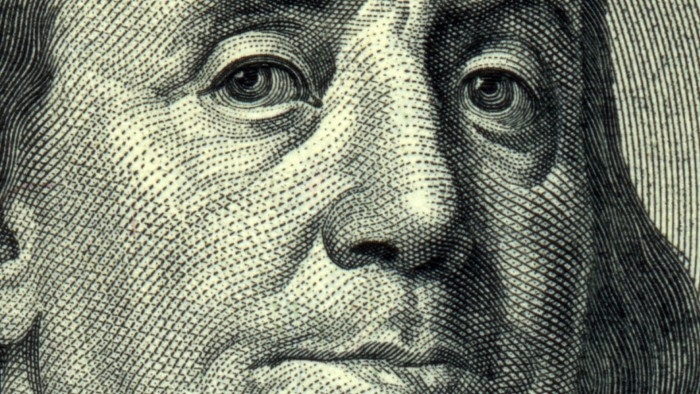Stay informed with free updates
Simply sign up to the US economy myFT Digest — delivered directly to your inbox.
The stock market car crash is naturally dominating attention. After all, this is only the fourth two-day 10 per cent decline since at least 1952. But the more alarming developments are happening in currency markets.
The DXY dollar index has bounced a little today, but the growing sense of unease about its trajectory is nearly palpable. Yesterday, we wrote of Deutsche Bank’s concerns that we should “beware a dollar confidence crisis”, and this morning Société Générale sounded a similarly dour now.
As SocGen’s chief FX strategist Kit Juckes pointed out earlier today, the US dollar’s exceptionalism has been powered by gargantuan inflows of foreign money over many many decades. “That money is thinking about packing its bags and heading somewhere else,” he warned.
The BEA puts the end-2024 US net international investment deficit at USD 26.2 trn (and the sum of assets and liabilities at USD 88trn). Anything that scares foreign investors away from US assets can have a bigger negative impact on the dollar than a shift (even a sizeable one) in the price of import and exports.
However, it’s not just European strategists at European banks dissing the American dollar. Goldman Sachs’ FX team are out with a new call this evening, and it’s a big one. They now see the US dollar’s weakness “persisting and deepening further”.
The trigger is not, per se, the extreme level of the “reciprocal” tariffs that the Trump administration rolled out this week, which they say were incorporated in its previous forecasts. Goldman’s changing view has more to do with its sharp reappraisal for what the new regime means for the dollar.
Like many other analysts, Goldman’s previously reckoned that tariffs would buoy the dollar. Now it thinks otherwise, “for a number of reasons”. Alphaville’s emphasis below:
First, the combination of an unnecessary trade war and other uncertainty raising policies is severely eroding consumer and business confidence . . . so that any Dollar positive impulses are being offset by the likelihood of lower growth.
Second, the negative trends in US governance and institutions are eroding the exorbitant privilege long-enjoyed by US assets, and that is weighing on US asset returns and the Dollar, and may continue to do so in the future unless reversed.
Third, and related, the implementation of the tariffs themselves is eroding the ability of investors to price these. While it is still true that currencies (and Dollar strength) provide the most natural margin of adjustment to US tariffs, as was the case both in the first trade war and also in the first episode of Canada/Mexico tariffs in late-Jan/early-Feb, the constant back and forth on timelines and the rudimentary calculations compound the uncertainty that underpins rising recession risks.
Moreover rather than clearly targeted tariffs that allow precise room for negotiation, with such broad, unilateral tariffs there is less incentive for foreign producers to provide any accommodation — US businesses and consumers become the price-takers, and it is the Dollar that needs to weaken to adjust if supply chains and/or consumers are relatively inelastic in the short term.
The upshot is that Goldman’s new base case is now the dollar’s “exceptional” position over the past decade is now reversing, which will benefit the euro and the Japanese yen in particular.
In forecasting terms that means the EUR/USD exchange rate will go to to 1.12, 1.15 and 1.20 over the next three, six and 12 months (from 1.07, 1.05 and 1.02 previously) while USD/JPY will go to 138, 136, and 135 in three, six and 12 months (from 150, 151 and 152 previously)
However, the most interesting part of the note is that even Goldman Sachs is becoming worried that the sun may finally be setting on America’s famous “exorbitant privilege” (and is willing to say so publicly).
That might be a little premature, but we can begin to freak out if we ever see multiple days of US Treasury yields rising and the dollar falling in tandem. That would be a pretty clear sign that some of that $26tn NIIP is truly heading for the exit.


